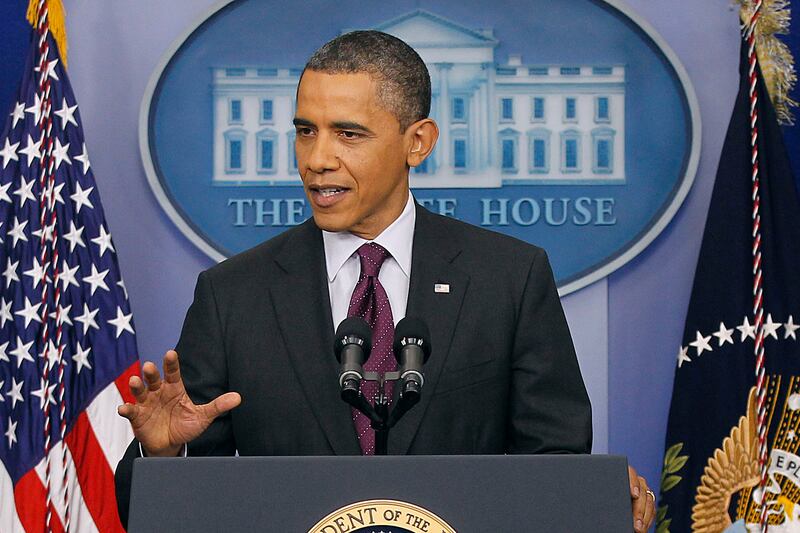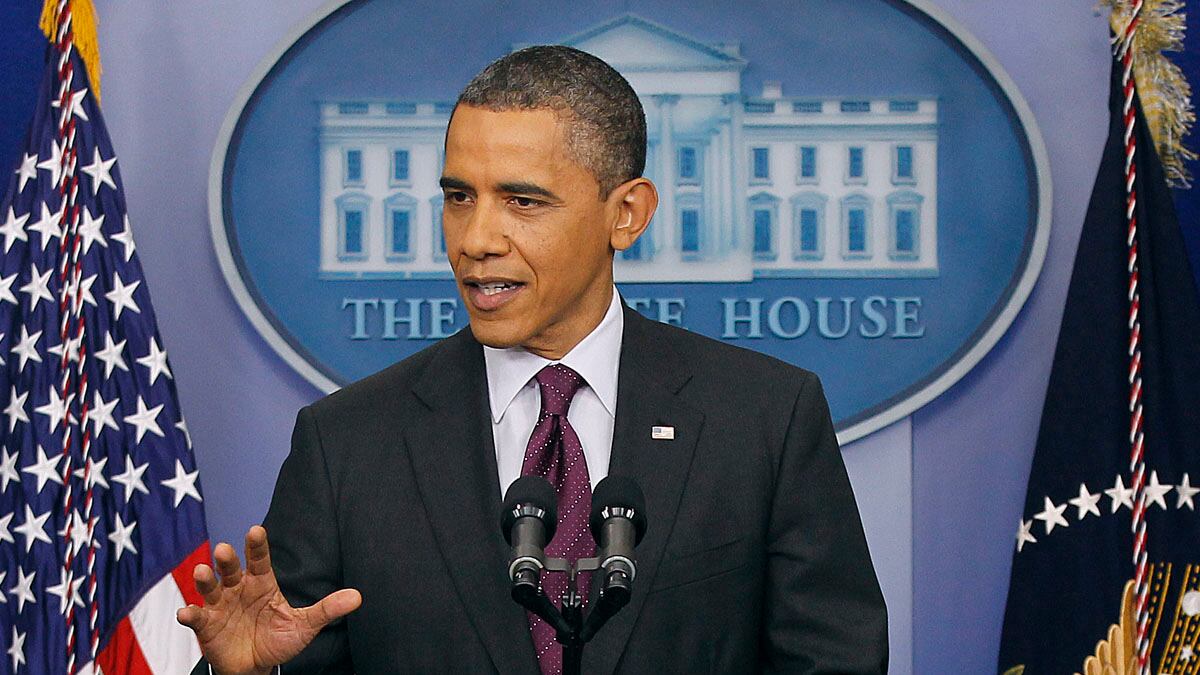The Republican presidential candidates have had a field day going after President Obama, and their attacks have gone largely unanswered. That changed on Super Tuesday, when Obama dropped his above-the-fray stance and used his first press conference of the election year to denounce the “casualness” with which Republicans on the campaign trail talk about war with Iran.

“Those folks don’t have a lot of responsibilities. They’re not commander in chief,” he said, and there are costs involved in sending young men and women into battle. “This is not a game; there’s nothing casual about it.” On a day when media attention is on the Republicans and their race for the nomination, Obama took the opportunity to draw a sharp contrast between his approach to the potential use of military action—“a careful, thoughtful, sober approach”—and what he characterized as “a lot of bluster and a lot of big talk.”
The press conference was staged so that Obama would be more than an afterthought in all the reporting about the GOP and Super Tuesday results. It was also an effort to respond to the barrage of negative attacks aimed at the White House before they take hold as fact. After all, it’s an article of faith in politics that an attack left unanswered invites problems and courts defeat.
Obama had met the day before for some three hours with Israeli Prime Minister Benjamin Netanyahu, where the possibility of a preemptive strike against Iran’s nuclear facilities dominated the discussion. Obama is arguing for time to let sanctions work; Netanyahu fears the window for military action is closing, and used his time in the United States to assert Israel’s right to act on its own if necessary. Republicans see an opening to assail Obama on the issue of Israel and to peel away some of Obama’s political support from Jewish voters in an election year.
Ticking off the various steps his administration has taken to confront Iran, Obama said, “Now, the one thing we have not done is we haven’t launched a war. If some of these folks think that it’s time to launch a war, they should say so. And they should explain to the American people exactly why they would do that and what the consequences would be. Everything else is just talk.” Clearly peeved at how Republicans represent him as insufficiently strong in confronting Iran’s nuclear threat, he said those “beating the drums of war should explain clearly to the American people what they think the costs and benefits would be. I’m not one of those people,” he noted, citing his belief that there is a window for diplomacy to work, and that “we’re now seeing noises about them [the Iranians] returning to the negotiating table.”
Asked what he would say to Mitt Romney, who in an op-ed piece that morning in The Washington Post called him “the most feckless president since Carter,” Obama responded with a broad smile, “Good luck tonight.” Amid laughter, a disbelieving reporter gasped, “Not really!”
“Really,” Obama said, still smiling and clearly enjoying the mischief of getting on the GOP’s playing field on its big day. A White House aide later noted with pleasure that Obama did not take the reporter’s bait. “He’s sticking to his day job, which is to lead the world,” the aide said. That was the contrast that Obama wanted to draw: a serious, sober grown-up you can trust with the lives of your children and grandchildren versus a field of Republican candidates trying to outdo each other banging on the drums of war.
The White House view is bolstered by the latest NBC/Wall Street Journal poll that shows a majority of Americans prefer diplomacy to military action in stopping Iran from getting a nuclear bomb; only 21 percent favor direct military action by the United States to stop Iran. Polls also show no appetite for U.S. military involvement in Syria.
The Obama campaign put out what it called an “Attack Watch” to counter various GOP assertions about Obama’s allegedly less-than-full commitment to Israel. The days are long gone when politicians subscribed to the notion that partisan politics stops at the water’s edge, a phrase coined in the late 1940s to indicate the two parties stood as one where critical foreign-policy interests were concerned. Using his bully pulpit to slow the apparent rush to war, Obama said, “This notion that somehow we have a choice to make in the next week or two weeks, or month or two months, is not borne out by the facts.”
If there was a theme to this press conference, it wasn’t the new mortgage-relief policies that Obama announced at the outset. He wanted to tamp down the hawkish talk and underscore that going to war is not something that should be done casually. “Typically, it’s not the folks who are popping off who pay the price. It’s these incredible men and women in uniform and their families who pay the price,” he said, recalling his visits to wounded veterans at Walter Reed hospital, and his meetings with families whose loved ones are not coming home.
There were some lighter moments in Tuesday’s press conference. Asked to respond to GOP assertions that he wants gas prices to go even higher because it would wean the American people off oil, Obama was incredulous. Could anybody truly believe a president facing reelection wants higher gas prices? Asked what he thought of Rush Limbaugh’s apology to the Georgetown law student who spoke out in favor of contraceptives as part of the Obama health-care plan, he said, “I don’t know what’s in Rush Limbaugh’s heart, so I’m not going to comment on the sincerity of his apology.” But he said he thought about his own daughters, and how he would want them to engage in an issue they care about, “even one I may not agree with,” and he wanted Sandra Fluke to know that her parents should be proud. As for the “war on women” that Democrats say Republicans are waging, Obama sidestepped the question, saying women are going to make up their own mind in this election, and that come November, that vote won’t be narrowly focused on contraception, but on broader economic issues that affect women and their families.






